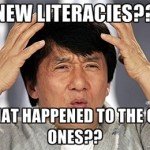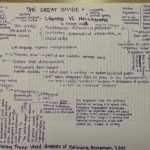
Keaton Kirkpatrick: Featured Blogger for Brandt’s “Sponsors of Literacy”
Deborah Brandt – “Sponsors of Literacy”
A sponsor of literacy is a broad term that applies to the resources and conditions that influence literacy practices. Sponsors are similar to the patron in a patron-client relationship, meaning a sponsor gives a writer the means to write for the sponsor’s implicit or explicit interests. There are two main kinds of sponsors that Brandt mentions. The first, who primarily shape the literacy practices of children and young adults, are other people (older relatives, teachers, priests, supervisors, military officers, editors, and influential authors). While people will always affect literacy learning in other people, Brandt goes on to mention institutional sponsors, which are sponsors that need more attention to explain.
The case example of Dwayne Lowery is given to explain institutional sponsors. Lowery worked at an assembly line of an automobile manufacture until he decided he could do more, so he went on to work at a municipal utility department. Being active in an employee union, he was able to travel to Washington, D.C. on a union-sponsored grant for union training. As his job and participation with his union continued, he observed that his literacy practices would have to shift in order to fit into the changing world, which required him to talk less and write more. His work became more competitive, reflecting the shifts in literacy at his work. This competition is an aspect I noticed in most of the points Brandt discussed with her idea of sponsors.
It can be argued that the idea of sponsors are deeply entwined with ideals of capitalism–at least that’s my take on them. Sponsors (especially those that are institutional) are constantly emerging at different levels and compete to shape what literacy looks like in the world. They give people materials and motivation to read and write for a variety of applications. For example, universities act as sponsors for faculty and students. The resources supplied (computer labs, printing services, the books at the library, and the technology used [like Blackboard] are some examples of resources), the administration’s allocation of funds, the ideals of faculty in certain departments, and the diversity of the student population are all kinds of sponsorships that impress a student and shape their reading and writing habits for a purpose. I’m sure you wouldn’t find one student who has earned a degree from Chico State who could claim that the university, its faculty, and its resources have failed to shape their literacy practices. Whether they shaped their literacy practices with affordances or constraints is another matter to research, but the idea that the university shapes literacy practices should be undeniable. The sponsors that led people to attend Chico State are other factors that influence literacy. At every level, institutions and individuals compete in some way to make their literacy sponsorships seem desirable to make more people use them. Every family likely has its own opinion of what literacy is and how it should be practiced. Each professor likely has an idea of what functional literacy is as well as their own definition and value of literacy, which they willingly or unwillingly impose upon their students. Every university tries to attract certain kinds of students by advertising their specific sponsors. At every level, there is a certain competitive aspect because literacy is influenced by opinions that are assumed right and shared often. Everyone has an idea of literacy that they think everyone else should take up to be successful; affordances and constraints for those ideas are constantly given by people in power. Literacy is based on supply and demand and shifts by the influence of those in power. It’s a commodity competing in a capitalist economy.
In contrast to the resources and ideas offered at a university like Chico State, I went to Lassen Community College (LCC), where the classroom practices and resources differed greatly. My favorite example was in a survey course for late British literature. The English degree at LCC was a brand new offering at the time (I was one of the first students to complete the program), so the first surprise was classroom size. None of the literature courses I took at LCC had more than 10 students–most had 5 or 6. The next surprise was how the professor taught the class. Initially, I thought we’d discuss literature in a literature course. I was wrong. For the majority of class, we read assigned texts aloud to each other. We never had to read anything at home. If we had time, at the end of class we had a 10-minute discussion about what we just read. Most of us in the class weren’t talkative and didn’t have the vocabulary and tools to talk about texts in college, so these discussions were usually quiet. The professor never asked us to annotate texts, never encouraged us to have complicated discussions, and never offered strategies for approaching texts (aside from modeling how to read texts aloud to each other). Somehow, I still got out of community college wanting to study English (specifically British literature). I’m guessing I didn’t know any better until I got to Chico State and realized what strategies and resources the faculty and staff at this university sponsored (collaboration, Google Docs, classroom discussions, and the library to name a few). No longer am I writing only for the professor and shaping my papers to exist only in a course; instead, I’m imagining how each paper might exist outside of the class. Specifically, I’m considering creating a portfolio (it’s a shame I haven’t made one already) as well as how I can make my academic work more accessible with digital platforms and tools. These considerations have been made because of what is sponsored at Chico State and by the faculty I’ve worked with. I’d never have thought about portfolios without my work as a mentor with freshmen; I’d never have considered writing my notes in a Google Doc with the intent to collaborate on them for a study guide if it weren’t for a class where the professor said she wouldn’t provide a study guide, but we could still work together and make one ourselves; I’d never have considered showcasing my work in multimodal formats without classes giving me the freedom and strategies to work on multimodal projects. This is all to say sponsors have influenced all of my literacy practices, though I hadn’t realized it until now.
Notes from Class
- What is Brandt up to?
People’s literacies are dependent on the sponsors they decide to value. The responsibility relies on people providing access to literacies; they shouldn’t be secretive or kept close. Sharing is important for success.
Being a sponsor and being aware of being a sponsor is important; sponsors have influence and decide what other people care about; sponsors have a lot of responsibility and authority.
Literacy is commodity you can trade for other goods and services.
Every class/community has unique literacies that are unique to them.
- Sponsorship and access (Raymond and Dora)
There are more layers to literacy for people who aren’t properly sponsored.
Socioeconomic factors matter
Students who aren’t sponsored well and are new to universities don’t understand their boundaries. They also don’t understand the resources available to them.
- Sponsorship and the rise in literacy standards (Dwayne)
People who grew up with new technologies might have an advantage over those who were born without those technologies and had to learn them.
Constant job switching and learning new writing strategies is a new concept.
Staying in a field and changing literacy practices to remain in the field—is there a point when people can’t stay in the field due to literacy practices being too different from what they know?
- Sponsorship and appropriation in literacy learning (Carol and Sarah)
Do skills in work/public life transfer to other areas of our lives? Or do we create a place in other areas in our lives to transfer the skills we learned?
There is overlap, but the question of appropriating a literacy practice to other areas of life may or may not be conscious. It happens, but how does it?
Models are important in learning new literacies.





